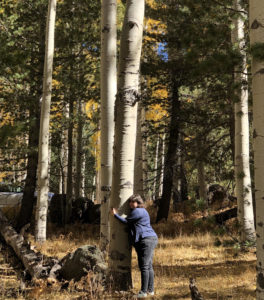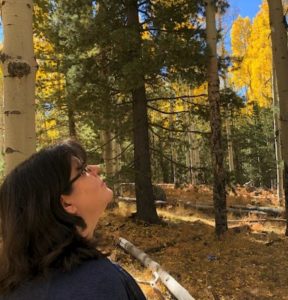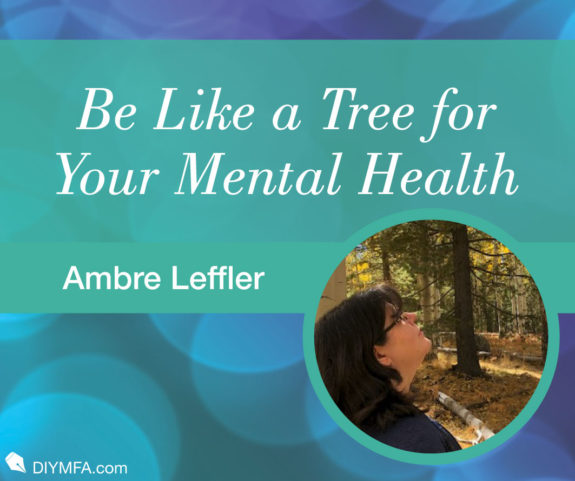What have you done recently to nourish your mental health? In fall, trees slow down in preparation for taking time for rest. They stop producing chlorophyll and drop their leaves, knowing there will not be enough sunlight to create the chemical reactions for the sugars they need.
Trees are smarter than we are as humans. We work long past the time of much-needed rest, completely ignoring the signals from our bodies and minds that we don’t have the fuel, literally or figuratively, to keep working. I’ve written my way through the pandemic without taking a break and my fuel tank is on empty.
Several Olympic athletes at the Summer Games in Tokyo pushed themselves beyond what was safe and had the courage to say they needed a break. Creativity is a solo act without a coach to assess the writer’s wellbeing. I always spend time with trees when I need to replenish energy.
I’ll be following my own advice that I am sharing with you here: be like a tree for your mental health.
Feed Your Crown Wisely
Trees gather energy by receiving sunlight and then converting this energy in their leaves. The trees who survive get the proper amount of sunlight for their growth. If trees grow too quickly they can’t sustain the amount of fuel they will need to take in through their leaves.
Think of each writing lesson or practice as a source of energy for your leaves. Be selective in what you take in. It is overwhelming when you absorb information you can’t immediately use. Pace yourself. The right information will be there for you at the right moment. Finding what works for you at a rate just right for your growth ensures a sustainable writing career (and preserves your mental health).
Protect Your Inner Bark
The outer bark of a tree protects the inner bark. Trees survive wildfires, insects, foraging by animals, and infections thanks to this protective outer layer.
At the beginning of my writing journey I was excited to share every project I was working on. Well-meaning people would ask when my book would be published, or why I wasn’t finished with my book, or where they could read my article. It is challenging to explain the publication process to those who are outside of it.
Likewise, not everyone understands the cyclical nature of the creative world. As soon as you have finished one project, you are working on the next. Also, there are people who will sabotage your success, consciously or unconsciously.
To protect your inner bark, your mental health, create your signature story about your writing process. When people ask for updates on your work, you will have an answer ready in a way that sets boundaries and protects you. I am now selective in how and with whom I share updates on my writing projects. It helps keep away feelings of failure when I answer “Not yet,” or “Hopefully soon.”
Nourish Your Roots
A tree’s roots can extend for miles just under the surface of the soil or grow down several feet below ground. Trees are resourceful in finding sources of water for growth. If water dries up, they will extend their roots in another direction to find more.
It helps to engage in other creative activities to keep your writing life in balance. For some people it might work to try several different things in a broad radius. For others it works better to try just one thing but at a deep level.
Tap into other sources to feed your creativity. Try a workshop at a museum. Or get in the kitchen for some baking.
If your go-to creative outlet isn’t giving you the boost you need, switch up your routine with something new.
Find Your Fungi

It appears that a tree stands alone, but this is not the case. Underneath the soil there is a massive network of fungi attached to the tree’s roots communicating and sharing nutrients among other trees. Some in the nature world call it the “wood wide web.” This fungi network is so complex it is not yet fully understood by scientists. They do know it is vital for each tree’s healthy growth and sustenance.
Writing is a solitary practice. But just like a tree, no writer can go it alone. The creative process takes an abundance of mental energy and fortitude, which can take a toll on your mental health. This is why I recommend finding your fungi, the people who can support you in an exchange of energy and information. I found my fungi with the DIY MFA community. Look for yours in a writing group, friends you made at conferences, at your local bookstore, or classes at your library.
Spend time with trees. You will get a boost of oxygen. A leisurely walk in the forest, aka forest bathing, has been scientifically proven to reduce stress hormones. And time in nature increases problem-solving skills and creativity.
Am I telling you to hug a tree? Yes. (The photo with this article is of me hugging a tree). Tree time with the aspens is a fall tradition essential for my mental health.
Tell us in the comments below: What do you do to preserve your mental health?

Ambre Dawn Leffler is a Tai Chi instructor, gardener, and weather geek who writes about vegetables, seasons, communing with nature, and the interconnections of mind/body. She loves trees and cherishes time in their presence. Learn more about her tree time, garden residents, and wellness practices at her website ambredawnleffler.com and seasonal inspiration from her newsletter https://ambredawn.ck.page/newsletter-page.







